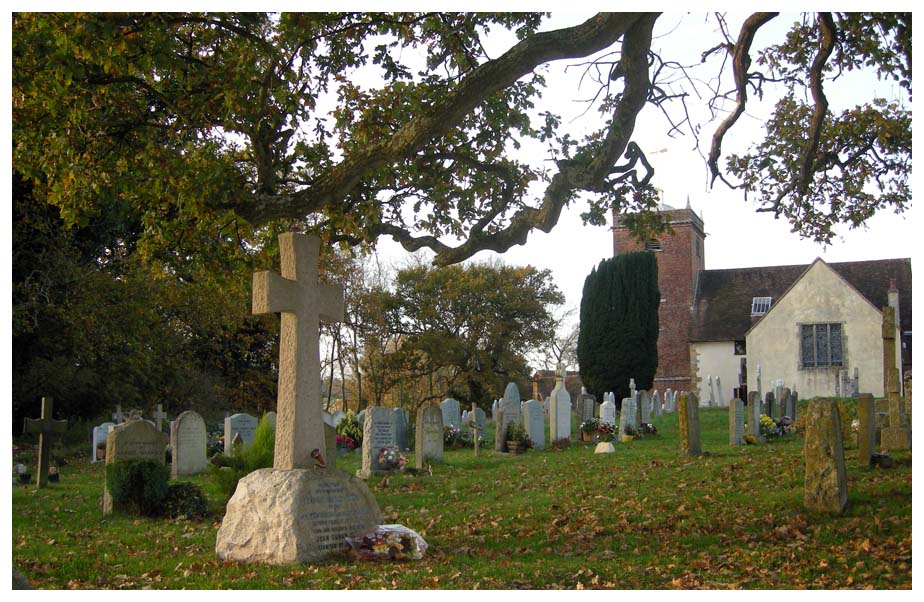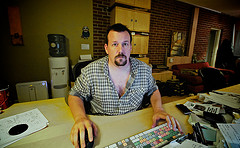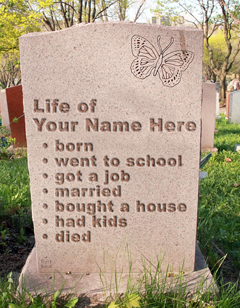When you die, will it be full of regret at how you have lived your life? Will you have dreams unfulfilled – or pop off knowing you have lived your life to the full? May sound macabre, but death is one of the few certainties in life. However, you’d think we’ve forgotten we’re mortal the way we allow life to slip away.
 The thoughts of those who know they have very limited time left have often been wake up calls to the rest of us. I discussed Randy Pausch’s last lecture a couple of years ago – now over 14 million views on YouTube! His main message was
The thoughts of those who know they have very limited time left have often been wake up calls to the rest of us. I discussed Randy Pausch’s last lecture a couple of years ago – now over 14 million views on YouTube! His main message was
“never stop dreaming, never stop trying to achieve those dreams”
There has been other work about the great truths to be found in the last moments of life, notably “Seize the Day” (formerly titled “Intimate Death”) by Marie de Hennezel. From her work as a psychologist in palliative care her message is very much about making the most of life while we have it – not forgetting our mortality.
“You just need to realise that life is precious, and remember that every day.”
Regrets of the Dying
I have recently come across a blog written by someone else who has worked in palliative care. She also wrote down and collected the dying thoughts of those she cared for. And now the author, Bonnie Ware, has also published a book based around an article on her site:- Regrets of the Dying.
Whilst its well worth visiting her blog and reading the article, the 5 regrets she highlights are as follows:-
1. I wish I’d had the courage to live a life true to myself, not the life others expected of me.
Apparently this was the most common regret of all. People died knowing it was choices they had made, rather than “circumstances” that had let these dreams slip by. Once your health starts to fade, it becomes increasingly difficult to catch up:-
“Health brings a freedom very few realise, until they no longer have it.”
2. I wish I didn’t work so hard.

This was predominately a male concern, many who had missed the golden years of their children’s lives by being at work.
3. I wish I’d had the courage to express my feelings.
Feelings are usually suppressed to keep the peace with others. However,
“…although people may initially react when you change the way you are by speaking honestly, in the end it raises the relationship to a whole new and healthier level. Either that or it releases the unhealthy relationship from your life. Either way, you win.”
4. I wish I had stayed in touch with my friends.
Many had let golder friendships slip over the years, caught up in their own lives:-
“It is all comes down to love and relationships in the end. That is all that remains in the final weeks, love and relationships.”
5. I wish that I had let myself be happier.
Not realising till it was too late that happiness was an option; Stuck in their comfort zone, letting fear of change prevent them from living the life they truly desired. With the ultimate self confidence booster:-
“When you are on your deathbed, what others think of you is a long way from your mind.”
But before you spend £20 on the book…
Some of these ideas do seem rather cliched and could have been used to close an episode of Desperate Housewives. And do the dying have any special “clarity of vision” – especially if they are taking high doses of pain killers?
It could be argued that the advice is both selfish and goes against any attempt at stability in your life. Don’t bother working hard (be lazy – why bother with a career); Say what you think (who cares who you hurt or offend); Cling onto all friends (which takes some maintenance, other things may be more important); Do what you want (which may mean abandoning family, friends and other structures around you); Be happy (not in itself an achievable goal).
These regrets are also formed with the benefit of hindsight. And in some ways a regret is another way of framing “I should have...” or “shouldn’t have“, rather than accepting that throughout life we make choices. We will all make mistakes, suffer setbacks and failures, but that’s all part of life’s rich tapestry…
And whilst we’re having regrets…
I haven’t touched on the ethical issues relating to this article and book, nor how valid and reliable the “data” is. My wife has worked in palliative care for 25 years and says she would be struck off for such an enterprise. And the blog gives no indication of how many subjects or what sort of cross section of society they represented.
But whatever the criticisms, the joy of such articles and books is it makes you think and reflect. Question your own life, and in particular reminds you of your mortality.
I frequently reflect on what I have to be thankful for, starting with so many things we take for granted such as living in a safe, stable country with sufficient food and water. I’m sure when my time comes its these sort of thoughts I’ll treasure – the regrets won’t get a look in. How about you?
Photos by David Rogers; bark on Flickr; cogdogblog on Flickr
Dear David –
This is one of the most important posts I have read in a long time.
We all have this little secret. Everyone will die – but not me.
And yet, as we age, we find more evidence that it is not true. You start losing treasured loved ones – sometimes too young — and most important, you see more and more people of your exact age in the Obituaries every day. You probably never even looked at them before.
Looking back at my life, I find I do have regrets. Situations I could have handled better, Choices too impulsive.
I have fewer regrets now. Perhaps I have become wiser or braver. I am starting to be more forgiving of myself. If I had known better, or what I know now, I would have done better.
This post needs to be read more than once. We have to think more.
Corinne
Thank you for your comment and kind words. We will all have events in life that, with hindsight, we could have handled better or made a different decision. But my interpretation of regret is when we dwell on the past wishing we’d done differently – rather than moving on and accepting we’re now on a different path. So do be kind to yourself!
David
Hi David,
Great post. I have realize since the death of both my parents, I am next on the list. Does this bother me, not really, but I can identify with going out with no regets.
3. I wish I’d had the courage to express my feelings. This is the biggest for me. I am getting better at it all the time. there are a few people I would like to write a letter to and say, “So what is your problem when it comes to me?” Those people would be family members.
Maybe with this post I can be me and wirte that letter.
Thanks David for the push!
Blessing to you,
Debbie
Debbie
I can empathise with you, families are often the hardest to say what we feel to. Good luck, and thanks for your comment and kind words.
David
Could it be that the regrets of the dying are a function of what their dreams were, provided they had any? I believe most people don’t get what they want because they pretend to not know what they want. For them I imagine dying comes with more regrets – including the realization that knowing what you want had been an available option all along – than for people who by the time of their death have arrived somewhere on purpose. Sure, we all arrive somewhere, but only people with dreams and courage arrive somewhere on purpose. Why have regrets when you finish well, with gratitude? Why have regrets when you have faith in your Source – God? I get it. I’ve had tons of regrets in my former lives, too. Yet I’m questioning the wisdom of having, or worse, entertaining regrets, the longer the more so. Maybe I’ll have to wait for my own death to get the answer. In the meantime, your blog post and related books and resources are very useful, even necessary. They get us thinking and more importantly, they get us taking action … before it’s too late. Keep up the good motivating work!
Beat
Thank your for your really comprehensive comment. I like your point about “arriving somewhere on purpose”, which I don’t believe many people do. Where we are now is the result of many factors, but we all contribute with the decisions and actions we take (even if we don’t deliberately do either).
Ironically it could be argued that perhaps people should have more regrets – for just drifting through life and not doing what their calling was on purpose. Thanks again
David
David,
Really great read but in one way it ‘hurt’ to read it. I tend to work too long hours – always have done and when my kids were small I was away from home a fair bit. Not too much but enough for me to look back and think it was too much.
Now I work from home…they are too old themselves to want Dad around!
Andrew
Andrew
Its a version of the old chestnut “nobody ever said on their deathbed that they wished they’d spent more time at the office” – but work has so many other bearings on our quality of life that are positive. We can’t turn the clock back, but we can learn from the past and incorporate into how we live our lives now. Thanks for your nice comment
David
I too work long hours but am lucky enough to work them from home and see my son every day. I think everyone has regrets, however it’s how they affect you that is important. I think it was Martha Stewart who said something like “I have no memory for bad things” or something like that, and I’ve tried to be more like that recently. What has happened has happened, and while I may regret somethings, learning from them then moving on is more important than regretting them all the time.
Very interesting post, thanks David.
Joel
Interesting, philosophical approach which we should all learn from. “Learning and moving on” is a great way to live. Thanks for your comment.
David
Hi David,
I’m so grateful that I read this post before it’s too late. I truly hope that I can eliminate all those regrets. Like Joel, I work from home too and I always tell my better half that we should be grateful of that.
Raymond
I must try this “work from home” way of life someday, although like Andrew too late for seeing the kids! Glad you found the post useful, and thanks for your comment.
David
Avoiding regrets is one of my biggest goals for my children. If only they could see what I see! Sometimes it’s so frustrating when I can see them making choices they’ll be sorry for later. Ugh. 🙂
Amy
Its very hard being a parent sometimes! We like to say we learn from our mistakes, but we don’t want our kids to suffer – or make the same mistakes we did. I hate to say it but, as my youngest two approach 21, it doesn’t get easier… Thanks for your comment.
David